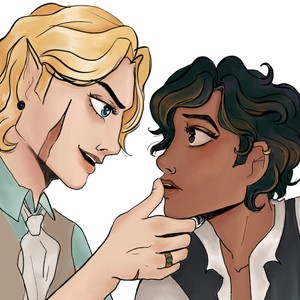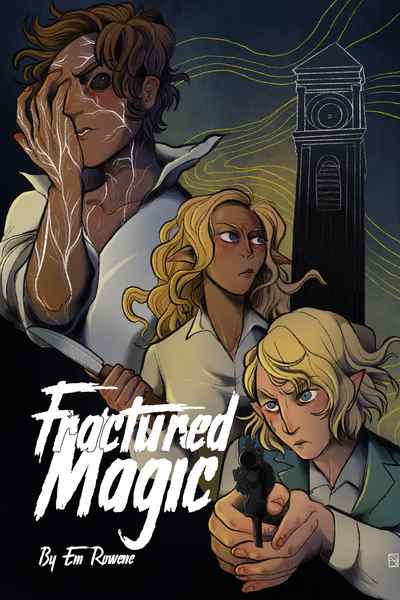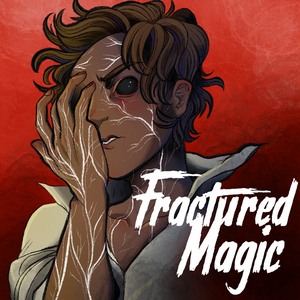“Pardon me,” Gareth said, loud as he could without being rude. He tapped on the glass pane of the phone booth he was trapped in, and when that didn’t work, shoved at the door. Finally, the dragon blocking his way looked over her shoulder at him, long neck twisting. Without so much as hissing an apology, she moved to let him out.
“Thank you,” Gareth said stiffly, before taking a look around.
Currently, the world hung on the precipice between summer and fall. The wind carried a chill in from the east, laborers donned heavier layers than they had a week ago, and the leaves were beginning to change, reds and oranges creeping along the edges of crisp greens. It was the time of year when the world exchanged one kind of beauty for another, the time when people looked back to appreciate what they had and looked forward to the promise of what they may get.
It was Gareth’s least favorite time of year.
He loved how the grounds around his estate changed, and even more so, loved walking them with his wife, the air cold but her arm warm where it rested on his own. He loved playing with his daughter in the fallen leaves the servants raked up.
He just hated the politics.
Every fall, Unity hosted a series of political conferences. All the world’s important people flocked to the capital city of Gallontea to attend and Gareth’s sister, a Unity representative herself, insisted Gareth be among them. So every year, he reluctantly came.
He cast a baleful look at the bridge behind him, which led to Unity Island. From here, Gareth could make out Unity’s marvelous clock tower in the distance, its glowing face cutting against the city’s smog and marking it as just past one. He was free from the conferences for the day – early, too.
Across the square, a crowd gathered around a colorful archway, the words “Rinehart Festival Grounds” painted on the fluttering canvas in friendly lettering. Beneath it sat a striped ticket booth, a nympherai girl with bright flowers in her hair and skin the texture of birch lounging behind the counter. A line flowed out from the booth, reaching almost to where Gareth stood.
Gareth glanced back again at the clock tower, then joined the line.
Nearly half an hour of waiting passed before a small pair of hands grabbed the leg of his trousers and a piping voice yelled, “Surprise!”
Gareth twisted to face the newcomer, a hand flying to his heart in a feint of shock. “Ofelia! By the Three, how sneaky you are!”
A round-faced girl in a neat purple dress grinned up at him. “Momma said you wouldn’t be fooled.”
“Your mother was wrong,” Gareth said, looking up as Isobel joined them.
She wore a fondly exasperated smile, but her breathing came heavier than usual. At Gareth’s concerned look, she waved him off. “Ofelia rushed me the whole way here,” she explained. “I’m too slow, apparently.”
“Well, your timing was perfect,” Gareth leaned in and kissed his wife on the cheek. “You look beautiful, Bel.”
Isobel smiled, pleased. She wore a billowing white dress, one that left her tan, slender shoulders bare and cinched just above her stomach, round with pregnancy. “Careful with your compliments, love, or I’m going to think you want something.” She looked over at the ticket booth. “Ofelia’s been begging to come to the festival since we got here. I’m glad you called, but how did you get out of the conferences?”
“I didn’t,” Gareth said, lowering his voice before saying,’ “The Magistrates dismissed everyone early.”
Isobel arched a delicate eyebrow. “Whatever for? That’s strange, isn’t it?”
“Extremely,” Gareth said. He frowned, remembering how abruptly the three Unity Magistrates had turned everyone out of the room. “A telegram came from Illyon. Urgent, apparently.”
Isobel matched his frown. “Something must be wrong. They wouldn’t cancel the conference, otherwise.”
“Whatever it is, Unity will deal with it,” Gareth said.
Having had enough of being ignored, Ofelia tugged on Gareth’s sleeve. “Do you think that man will be here?” she asked. “The one from last year? With the fire whip?”
“I’m sure he will be,” Gareth said, smiling down at her. She looked like her mother, with dark hair and soft features. In Ofelia and Isobel’s presence, the knot of tension that always found its place between his shoulders during the Unity Conferences began to unwind.
Ofelia nodded. “I hope so. Let’s go find him.”
“We have to get inside first, dear,” Isobel said.
Finally, the three of them stepped up to the ticket booth. While Gareth fished out his pocketbook, the nympherai ticket-girl leaned over the counter and waved at Ofelia. Ofelia waved back, staring with wide eyes at the pinks and purples of the girl’s hair.
“You like them?” the nympherai asked.
Ofelia nodded and the girl laughed, the flowers swaying with the movement. She passed three tickets to Gareth, then plucked one of the flowers from her hair, reached down, and tucked it behind Ofelia’s ear. Isobel thanked the girl as they continued through the archway, where the path widened and the cobblestone gave way to a dirt trail packed down by thousands of feet over hundreds of years. Gallontea, an amalgam of all the cultures under Unity’s banner, offered plenty of distractions, but none so chaotic as the Rinehart Festival.
A wave of sounds, colors, noises and smells hit the Ranulfs at once. Gareth and Isobel had to pause and adjust, but Ofelia forged ahead, already pointing out all the things that caught her eye. She begged to stop at each of them, only dissuaded by Gareth’s entreaties of, “Let’s just see what they’ve got further along, hm? The gentleman with the fire whip could be just around the corner.” Even still, their small trio lingered at every juggler, stilt-walker, and fire-breather that caught Ofelia’s fancy.
Before long, their feet started to drag and the booths all blurred together. Gareth stopped and bought them all meat pies, the safest of the bizarre snacks the various festival vendors were peddling, and they began searching for a place to sit.
“Gather round, gather round!” someone called. “This is a show you won’t want to miss! The Webhon Players are rising stars in the world of theater, and you can see them here now! Hey, you three!”
The speaker stepped in the Ranulfs’ path and crouched in front of Ofelia. He was dressed in bright colors and a tall, feather-plume hat, fit for attracting the attention of a crowd. “Do you like Egil stories, little one?”
Isobel laughed and covered her mouth with her hand. “Someone in this family certainly does,” she said, quiet enough for only Gareth to hear.
Gareth cleared his throat. “There’s an Egil show happening?” he asked.
“Yes, starting any moment now!” the man said, gesturing grandly to the stage on his right, just off the main path. The rows of benches in front of it were packed, but the man stood and ushered the trio toward them anyways. “There are still seats open on the sides – yes, that’s it, there you go! Enjoy the show!”
Gareth, Isobel, and Ofelia had only just managed to settle in their seats when shadows began shifting in the wings of the stage and fog crept onto its surface in thick tendrils. Paired with the overcast sky above and the stone skene behind, it set a dreary mood. The silence stretched on, and only when the crowd began to show the first signs of impatience, shifting and murmuring, did a figure in a deep red cloak step onto the stage. When all eyes were on him and the crowd had once again stilled, he took a deep breath. It was like a spell, entrancing and enrapturing; the crowd leaned forward on his inhale, back again on his exhale, swaying as one.
When he spoke, the spell crested. The festival sounds, the distant waves crashing against a rocky coast, it all faded into the background. The man’s voice was a clear baritone, rich as a golden-red sky at sunsset with the same gentle melancholy as the keen of a fine violin. Gareth craned his neck, trying to see beneath the hood, but the man’s face was hidden in shadow. The better for it, Gareth thought. If the face didn’t match the voice – and it couldn’t possibly – the illusion would be ruined.
“The days following the Great War were dark, but heroes rose up out of that darkness: heroes who protected the people and brought hope to a world that had long been hopeless. Among these heroes, one stood the brightest: Egil.”
The narrator paused while the crowd cheered, Gareth among them.
“Egil, as you all seem to know,” the narrator continued, dropping the omniscient persona as sarcasm bled into his voice, “Became the symbol the world needed to heal. He saved lives, ended battles, and made mischief as much as he made a name for himself. But as heroes inevitably do, he eventually grew tired from a lifetime of bearing the people’s hope. He decided to seek a place to call home.
“Egil settled in a golden city that has since passed into memory. The city was ruled by a King who had seen the rise and fall of the Great War and who had learned from it. Egil enjoyed peace here, for a time. But when the King fell ill, the people turned on the ruler who made them what they were and Egil could not stand idly by.
“This is the story of how Egil saved a King and lost his sanctuary.”
The narrator backed off the stage as he spoke, and from the other wing, two men walked on. The first was dressed in golden fabrics draped over and around him, secured by delicate fastenings. He was elegant and soft, in stark contrast with the man beside him.
“How is your father this evening?” the second asked. After being so mesmerized by the narrator’s soft voice, this man’s jarred Gareth out of the dream. The man wore an archetypal hero’s ensemble, stage armor with a large sword at his side. This had to be Egil, and the other the young prince Egil befriended, who had the heart of his father yet unmarred by tragedy.
“No better, I’m afraid,” the prince answered. “The Council is growing impatient. I’m worried they’ll take matters into their own hands, soon.”
“I’m certain your father will be better before then,” Egil said. Both hero and prince stopped abruptly as a woman entered from backstage. Different as Egil looked from the genteel prince, both at least belonged in this world – the world of plots and subterfuge, of heroism and hope. This woman was something wholly other. She moved toward Egil as if guided on a breeze, her feet barely touching the ground.
Anyone who’d heard of Egil also knew who this was supposed to be: the woman who flitted at the periphery of all the world’s best stories, heralding strange comings and foretelling events that would come to pass. Egil and the Oracle’s paths wound inextricably together, the Oracle warning of coming troubles and Egil preventing them.
“You!” Egil cried. “What are you doing here?”
“I’ve come with a warning,”
“Of course. My friend,” Egil said to the prince, “Allow me to introduce you to the Oracle of Damael. She’s a dear friend of mine, but I suggest you leave before she speaks her part. Her prophecies are never kind to those who hear them.”
Before the prince could leave, the Oracle stopped him. “Stay. This concerns you, young prince. I had a vision – there is one in the castle who would see your father assassinated. Egil, you must stop him before it is too late.”
The true story began there; Gareth settled in to watch, growing quickly used to this gruff Egil.
Egil stories had always fascinated Gareth. It was something about the complexities of Egil’s character, his righteous anger and its battle with kindness and compassion. It was something about the way people reacted to him, the way the hero Egil was a constant across species, cultures, and banners. Egil was strong, impossible, magical; you knew, logically, that he couldn’t exist – not as he did in the stories, at least – but you wished he did anyway.
Egil’s were the stories that made you dread the ending, when you would have to take a step back and remember that magic and monsters don’t exist and that if you want to be a hero, you have to start small. They were the stories that made you try to do better, to be that hero, to slay your monsters, to learn that magic is real and that it’s in the small things. They were the stories that made Gareth who he was.
But something fascinated Gareth even more than Egil stories, and that was the truth behind them.
Egil existed; the proof was everywhere. However, historical accounts of the man varied drastically from fiction. Gareth would know; he was renowned as a bit of an expert on the subject. He’d read everything he could, compiled collections of stories and cross-referenced them with the historical accounts cataloged and maintained by Unity. He’d written papers, dissected myths, and dedicated years of his life researching this mysterious figure.
And still, he somehow knew next to nothing about the man. It was a mystery Gareth couldn’t resist.











Comments (10)
See all